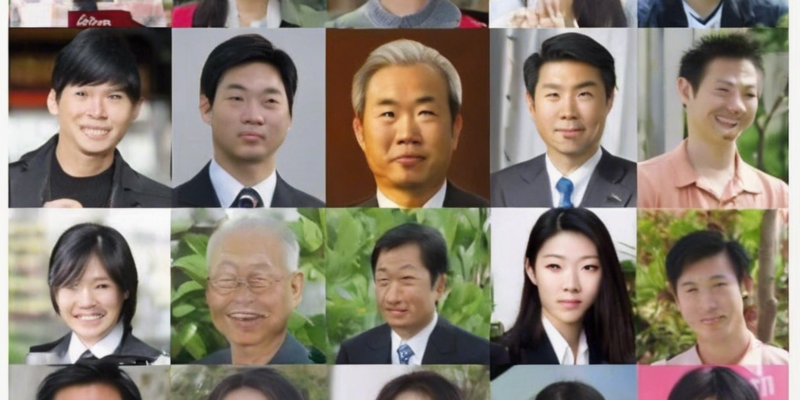Introduction
Names are an integral part of one’s identity and culture. While they hold significance and meaning, they can also generate amusement and laughter due to their unique sounds, meanings, or translations across different languages. In this post, we will explore some of the funniest Asian names that have garnered attention and amusement across the globe.
The Influence of Language and Culture
Names in Asian cultures often reflect values, traditions, and aspirations. However, when these names are transliterated into other languages, they can sometimes result in unintended humor. For example, certain Chinese names may sound like English phrases or words, leading to comical interpretations.
Hilarious Asian Names
-
Michael Soft: In some Asian countries, names like “Michael” can be common due to Western influence. However, when paired with a surname like “Soft,” it creates a humorous image of a gentle and delicate individual.
-
Winnie Lo: While “Winnie” may seem like a harmless name, when combined with the last name “Lo,” it forms a pun that sounds like “win below.” This unintentional wordplay can bring a smile to many faces.
-
Sum Ting Wong: This name gained widespread attention when it was humorously presented in a news report. While the name sounds like a statement in English, it is actually a phonetic representation of a Chinese name.
-
Anita Bath: When pronounced quickly, “Anita Bath” sounds like “I need a bath,” making it a name that is hard to forget. This playful name combination demonstrates how language nuances can lead to comedic results.
Cultural Differences and Humor
Cross-cultural interactions often spark moments of humor, especially when names do not directly translate into other languages. While these linguistic variations can lead to misunderstandings, they also create opportunities for lightheartedness and shared laughter.
The Impact of Social Media and Virality
In today’s digital age, amusing names can quickly gain traction on social media platforms, spreading joy and entertainment across diverse audiences. Memes, jokes, and viral content based on humorous names often circulate widely, showcasing the universal appeal of clever wordplay.
Notable Examples and Reactions
-
The case of “Sum Ting Wong” exemplifies how a simple linguistic misunderstanding can fuel internet memes and jokes, highlighting the global interconnectedness of humor.
-
Comedians and content creators often find inspiration in unique names, crafting jokes and skits that play with linguistic quirks and cultural differences.
-
While some individuals with unconventional names may face teasing or ridicule, many embrace the humor and uniqueness of their names, turning supposed drawbacks into sources of pride and amusement.
Embracing Diversity and Individuality
As we celebrate the diversity of names and cultures around the world, it is essential to approach humor with respect and sensitivity. While laughter is a universal language, we must always consider the feelings and perspectives of those whose names may be subject to amusement or mockery.
Closing Thoughts
In conclusion, funny Asian names serve as a reminder of the rich tapestry of languages, traditions, and identities that shape our world. As we appreciate the humor and wit behind these names, let us also recognize the beauty and significance they hold for individuals and communities. By embracing diversity and open-mindedness, we can find joy in the delightful quirks and nuances that make each name and person truly special.
FAQs (Frequently Asked Questions)
-
Are these names intentionally humorous, or are they genuine names in Asian countries?
While some names may be intentionally created for comedic effect, many are genuine names in Asian countries that happen to sound funny when translated or pronounced in English. -
How do individuals with funny names react to the humor surrounding their names?
Reactions vary among individuals. Some may find humor in their names and embrace the laughter, while others may feel sensitive or embarrassed by the attention. -
Do funny names only exist in Asian cultures?
Funny names can be found in various cultures around the world. Cultural differences in language and pronunciation often lead to amusing interpretations of names. -
What is the cultural significance of names in Asian countries?
Names in Asian cultures often carry deep meanings, symbolizing family heritage, values, aspirations, or blessings. They are an essential part of identity and personal connection. -
How can we appreciate funny names without causing offense?
It’s crucial to approach humor with sensitivity and respect. Enjoy the playful side of funny names while recognizing the diversity and uniqueness they represent. Avoid mockery or ridicule. -
Do famous individuals with funny names face challenges in their careers?
While some individuals with unconventional names may encounter challenges or stereotypes, many have overcome them through talent, hard work, and perseverance. A name does not define a person’s abilities. -
Can funny names lead to positive outcomes, such as increased popularity or recognition?
In some cases, funny names can indeed garner attention and popularity, especially in the age of social media and viral content. Embracing one’s unique name can be a strength and a conversation starter. -
Are there cultural differences in how names are perceived in Asian countries compared to Western societies?
Yes, there are cultural nuances in naming practices and perceptions across different regions. What may be considered humorous or unusual in one culture could be completely normal or even prestigious in another. -
How can we celebrate the diversity of names and languages while ensuring inclusivity and respect for all individuals?
By recognizing the beauty and uniqueness of each name, we can promote understanding, acceptance, and inclusivity. Embrace the richness of cultural diversity while treating every individual with dignity and kindness. -
Are there any legal restrictions on naming conventions in Asian countries to prevent funny or unusual names?
Some Asian countries have regulations in place to control naming conventions, aiming to prevent offensive or inappropriate names. These regulations vary by country and may include restrictions on certain characters, meanings, or cultural references in names.

